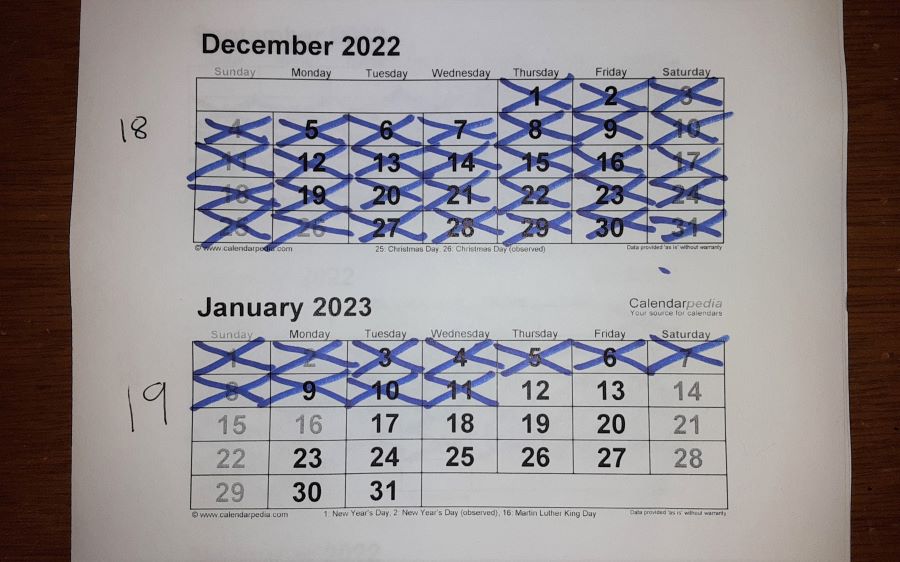
The biggest obstacle to habit formation is inconsistency.
Remember, creating a habit is like bushwhacking a new trail through the forest: If you don’t retrace your steps frequently, the path will quickly become overgrown and lost.
The gold standard for overcoming this obstacle is to do the same thing, at the same time, in the same place, every single day. If you can do that, you’ll have a rock-solid habit.
But many of the behaviors that we want to turn into habits don’t lend themselves to this approach. We can do them most of the time, but not every single day. And I’ve discovered through my work as a habit coach that people often feel ashamed of themselves because they think that all habits must be done every single day.
So, let’s take a minute to distinguish between these two types of daily habits.
Every Day, No Matter What
Some habits make sense to do every single day. These are behaviors that you can do no matter where you are and no matter what’s going on in your life. They should also be things that are important enough that you’ll go out of your way to make sure you do them every day.
Right now, I have two such habits: push-ups and meditation.
I began my push-up habit on June 13, 2021, and I haven’t missed a day. The routine is quick, and I can do it anywhere.
Building up my ability to do push-ups has been very helpful in rehabbing my shoulder, so it’s important to me to keep this going.
To miss a day of push-ups, I would have to be injured to the point where I couldn’t or shouldn’t do push-ups.
To keep track of this habit and to remind myself to do it, I use a calendar chain, which is the ideal tool for a single daily habit:

I began my meditation habit in September 2015 with the goal of doing it every day, no matter what. I missed a handful of days that first year, but I haven’t missed a day since September 2016.
Mindfulness meditation has greatly improved my patience, my creativity, and my ability to focus. Most importantly, it has made me much more confident that I’ll be content with whatever life gives me.
For me to miss a day of meditation, I would have to either be incapacitated or be experiencing a crisis where every minute of the day and night was filled with urgencies. I will always sacrifice 20 minutes of sleep to get in my 20 minutes of meditation.
The extreme consistency of these two habits has made them very well-established. I remember to do them every day, even when I’m on vacation and even when my routines are thrown off by unexpected turmoil or poor choices.
But not every habit makes sense to do every single day, no matter what, and that’s okay.
Every Day, Except…
Most “daily” habits actually fall into this category. They’re behaviors that you want to do regularly, but it’s not critical to do them every single day. They might be things that you don’t do on the weekends or that you don’t do when you’re out of town. Or they might be things that just aren’t terribly important to you, so they occasionally take a backseat to other priorities.
For example, I have a deep work routine for writing. Every day, after exercising and meditating, and before checking email or my phone, I write. Well, almost every day. A few days a week, this doesn’t happen. If I’m going skiing in the morning, or if I have an early appointment, I might not have time for deep work. And unlike meditation, I’m not going to sacrifice sleep to make it happen.
And here’s the key: I don’t beat myself up for this inconsistency.
I don’t feel guilty for missing days. I don’t think that I’m a failure when I don’t make time to write. Habit inconsistency should never be a source of shame.
Here are some other examples:
- I do some Spanish practice on Duolingo most days.
- I have an exercise routine that runs on autopilot.
- We eat salad for dinner almost every night.
These are almost daily habits that I have permission to skip when doing them doesn’t make sense.
To remind yourself of these habits and keep track of your effort, I recommend using an effort-tracking spreadsheet or to-do list checkboxes.
Restarting
The biggest drawback of almost daily habits is restarting when you come back from a vacation or some other hiatus.
If you miss several days in a row, or worse, several weeks, it’s very difficult to restart the habit. You’ve lost your momentum, and the neural pathway in your mind has weakened, so it’s going to feel unnatural to perform the behavior.
But difficult is not the same as impossible, so fight through the discomfort and begin again.
